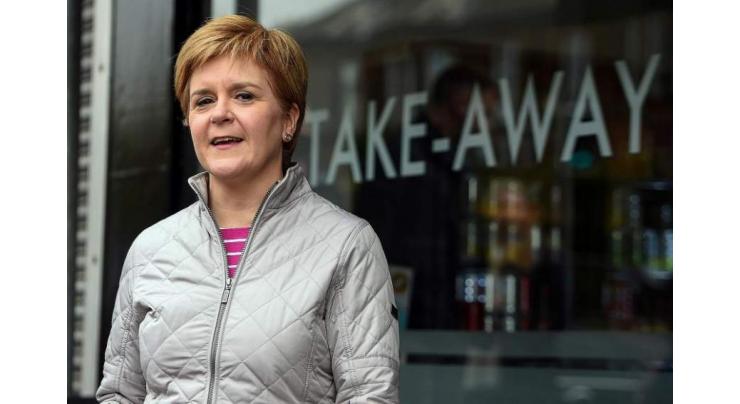
Sturgeon: Scottish Independence Leader Eyes Key Victory
Muhammad Irfan Published May 03, 2021 | 02:46 PM

Scottish National Party (SNP) leader Nicola Sturgeon goes into elections Thursday hoping victory will set the nation on the road to independence, but will have to overcome infighting and opposition in London
Edinburgh (APP - UrduPoint / Pakistan Point News - 3rd May, 2021 ) :Scottish National Party (SNP) leader Nicola Sturgeon goes into elections Thursday hoping victory will set the nation on the road to independence, but will have to overcome infighting and opposition in London.
The 50-year-old has become the pre-eminent force in Scottish politics, earning a reputation for assured leadership since becoming first minister in the country's devolved government in 2014.
She has earned points among voters for her management of the coronavirus pandemic. Her clear communication style is cast by her supporters in contrast to mixed messages emanating from UK Prime Minister Boris Johnson during the health crisis.
But what should have been a smooth build-up to the elections has been overshadowed by months of mudslinging between Sturgeon and Alex Salmond, her former mentor and predecessor as first minister.
The spectacular falling out between the pair over the handling of sexual harassment claims against Salmond has seen Sturgeon facing questions over her judgement and her reputation for attention to detail.
Disagreements between the two political heavyweights reverberated into the election campaign and threatened to split the independence movement, with Salmond forming his own pro-independence party called Alba.
Sturgeon's SNP looks set to dominate at the ballot box, with one Ipsos MORI poll showing it on course to win 70 of the 129 seats in the Scottish Parliament.
- 'Queen of Scots' - But questions remain over whether Scots will back independence in a referendum after all the infighting, with a string of surveys showing waning popular support for breaking away from the UK.
Nevertheless, Sturgeon said at the launch of her manifesto earlier in April that Johnson would have no "moral justification" to prevent a second vote on independence if the SNP emerges on top on Thursday.
The UK prime minister must approve the referendum, and has routinely ruled out a second one after Scottish voters rejected independence in 2014.
But in January, Sturgeon said Johnson was running scared, quoting Scotland's national poet Robert Burns, calling him a "timorous beastie".
For Sturgeon and the SNP, Britain's vote in 2016 to quit the European Union has changed the picture entirely. A majority of Scots wanted to stay in the EU.
A former lawyer labelled "Queen of Scots" by some in the media, Sturgeon argues for socially conscious policies she says were abandoned by the centre-left Labour party, once the dominant force in Scottish politics.
She was born in the industrial town of Irvine, southwest of Glasgow, in 1970 to an electrician father and a mother who remains active in local SNP politics.
Sturgeon joined the SNP aged 16, becoming politicised in the 1980s when Conservative Margaret Thatcher, still widely reviled in Scotland, was Britain's prime minister.
She studied law at Glasgow University and stood unsuccessfully for the House of Commons in 1992, aged just 21, before starting her career as a lawyer.
- Glued to phone - When the Scottish Parliament was created in 1999, with Labour ahead of the SNP as the biggest party, Sturgeon was one of its first wave of lawmakers.
Her nickname at that stage was "nippy sweetie" -- Scots slang for a pushy person.
Her mother Joan once joked about her daughter's hard-working tendencies: "The phone is never switched off -- many of my family can vouch for that." Sturgeon married SNP colleague Peter Murrell in 2010. The partnership has come under scrutiny after Murrell, the party's chief executive, was also embroiled in the Salmond investigation.
Sturgeon played a pivotal role in the party's campaign for the 2014 independence referendum. After 55 percent of Scots voted against, she took over as party leader and became Scotland's first female first minister.
"With all of our assets and talents, Scotland should be a thriving and driving force within Europe," she said in 2019.
"Instead we face being forced to the margins -- sidelined within a UK that is, itself, increasingly sidelined on the international stage."
Related Topics
Recent Stories

Mired in crisis, Boeing reports another loss

Session Awarding Ceremony 2024 held at Cadet College Muzaffarabad

Austrian ski great Hirscher to make comeback under Dutch flag

Pakistan, Japan agrees to convene 'Economic Policy Dialogue'

FM Dar conveys deepest sympathy on torrential rains devastation in UAE

Spain PM Sanchez says weighing resignation after wife's graft probe

Tennis: ATP/WTA Madrid Open results - 1st update

Long-lost Klimt portrait auctioned off for 30 mn euros

Osaka seals first win on clay since 2022 in Madrid

Earthquake jolts Karachi

Sindh minister orders operation after attack on police in Ghotki

TikTok to fight US ban law in courts
More Stories From World
-
Football: English Championship table
24 minutes ago -
Time for 'democratic transition' in Venezuela: opposition candidate to AFP
44 minutes ago -
Spain's Pedro Sanchez : a risk-taker with a flair for survival
54 minutes ago -
Football: French Ligue 1 table
1 hour ago -
Nadal will only play French Open if he can 'compete well'
1 hour ago -
Ukraine, Israel, TikTok: the massive aid package before US Congress
1 hour ago
-
TikTok to fight US ban law in courts
2 hours ago -
Football: French Ligue 1 results
2 hours ago -

Spain PM Sanchez says weighing resignation after wife's graft probe
3 hours ago -

Long-lost Klimt portrait auctioned off for 30 mn euros
3 hours ago -

TikTok to fight US ban law in courts
3 hours ago -

Anger among Ukrainians in Poland as Kyiv halts passport renewals
3 hours ago



